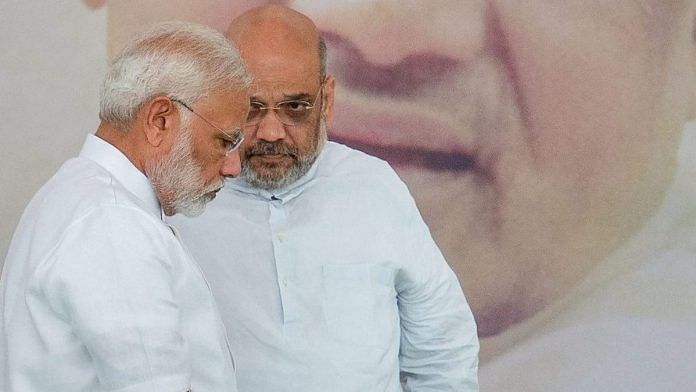While releasing the BJP manifesto, party president Amit Shah claimed that the NDA government has set an example in bringing transparency in the system. There are at least five reasons to question his claim.
One, the RTI law, enacted to ensure transparency in government functioning, has been under consistent attack by the Modi Sarkar. The latest onslaught has come in the form of a proposal to set up bureaucrat-led committees to receive and decide on complaints against information commissioners. Empowering sarkari committees to adjudicate on complaints against commissioners is a clear attempt to undermine their independence. It could potentially become a means to intimidate information commissioners to toe the government line – directions to disclose inconvenient information would invite adverse consequences.
Under the RTI Act, information commissions are the final adjudicators of the law. They decide on appeals and complaints of citizens who have been denied access to information under the Act. In recent times, the Central Information Commission (CIC) has often ordered disclosure of information, which has proved to be inconvenient and embarrassing for the government – from disclosure of educational qualifications of the Prime Minister to details of deliberations on demonetisation.
Also read: Electoral bonds help BJP coerce donors & that’s why Arun Jaitley rises to their defence
Recognising the crucial role of information commissions, the government has repeatedly tried to undermine their independence. The latest proposal comes in the backdrop of amendments that the BJP government was surreptitiously trying to push through, which would have destroyed the autonomy and independence of information commissions. The amendments sought to empower the central government to decide the tenure, salaries, allowances and other terms of service of all information commissioners in the country, despite the fact that these are already defined in the RTI Act. The amendment bill, which was sought to be introduced in Parliament, was finally shelved due to tremendous public pressure and pressure of opposition parties.
Second, the BJP government has not appointed a single information commissioner to the CIC since 2014, without intervention of the courts. In 2018, out of a total sanctioned strength of 11 commissioners, the CIC was functioning with just three commissioners – there were eight vacancies, including that of the chief. It was finally only on the orders of the Supreme Court that the chief and four other commissioners were appointed. The failure to make timely appointments has led to a huge backlog of appeals and complaints in the commission, resulting in inordinate delays in accessing information, which render the law meaningless for citizens.
Third, appointments to institutions of accountability like the Lokpal, the CBI and the CIC have been shrouded in secrecy. The government has doggedly refused to provide information to citizens about who applied for the posts, their qualifications and the criteria used for shortlisting and selection. Lack of transparency in the selection process has led to erosion of public trust in these important institutions of oversight. Taking serious note of the secrecy in the appointment of information commissioners, the Supreme Court had to direct the central government in 2018 to put on the website all relevant details related to appointments to the CIC.
Also read: Members of govt stats body quit over jobs report: Another agency damaged or overreaction?
Fourth, dealing a massive blow to transparency in the funding of political parties, the government introduced electoral bonds. There is an urgent need to infuse greater transparency in political party funding, which is widely recognised as the fountainhead of corruption in India. The electoral bond scheme, introduced by amendments made through the Finance Act 2017, prevents citizens from finding out who is funding political parties. It has ensured that donations worth thousands of crores can be made anonymously. Not surprisingly, the largest benefactor of the electoral bonds scheme has been the ruling party. According to reports, in the maiden tranche of the scheme in March 2018, the BJP bagged 94.5 per cent of the bonds worth a little over Rs 210 crore, without citizens having any way of finding out who made the donations.
Finally, there have been serious allegations of political interference in data estimations to suppress unfavourable statistics and reports. There has been controversy about the revision of gross domestic product (GDP) numbers and suppression of the NSSO data on jobs, which led to resignation of the acting chairman and another member of the National Statistical Commission (NSC).
Also read: Modi PMO won’t divulge corruption complaints against ministers despite CIC order
For a government that came to power on the plank of good governance and anti-corruption, the performance of the BJP on the issue of transparency has been dismal. Constant attempts to subvert the transparency regime appear to expose the real intent of the government – to not allow public scrutiny of its actions.
The authors are RTI activists associated with the National Campaign for Peoples’ Right to Information and Satark Nagrik Sangathan.




All claims made by all governments should always be questioned. These one way monologues and self certification have no place in a functioning democracy.